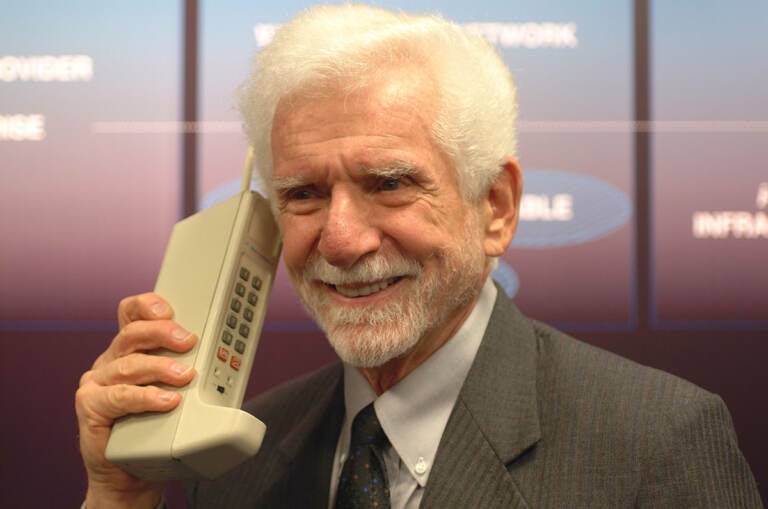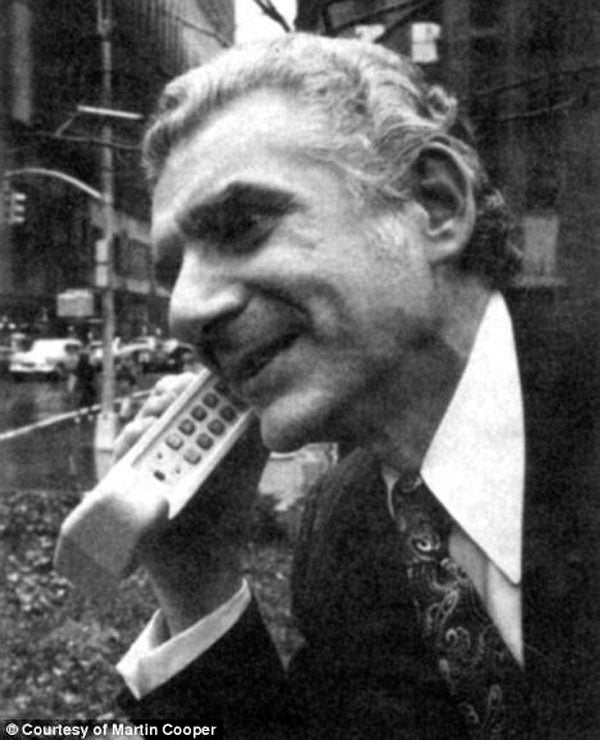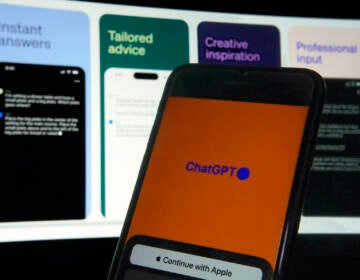‘Father of cell phone’ reflects on making first call and history 50 years ago
In celebration of the 50th anniversary of the first cell phone call, Martin Cooper, 94, talks about how his invention changed our lives.
Listen 11:41
Martin Cooper, engineer and inventor, made the first cell phone call on April 3, 1973. (Courtesy of Martin Cooper)
This story is from The Pulse, a weekly health and science podcast.
Find it on Apple Podcasts, Spotify, or wherever you get your podcasts.
Fifty years ago, Martin Cooper, an engineer for Motorola, stood nervously along 6th Avenue in New York City, about to do something that had never been done before.
He reached into his pocket for a little telephone book and dialed a number. Then a connection was made, and the person on the other end picked up. It was his competitor, Joel Engel, at Bell Labs.
“And I said, ‘Hi, Joel, it’s Marty Cooper.’ And he said, ‘Oh, Hi, Marty.’ And I said, ‘Joel, I’m calling you from a cell phone. But a real cell phone, a handheld, personal, portable cell phone,’” said Cooper. “As you could tell, I was not averse to rubbing it in.”
This was the first cell phone call ever made. It was a call that would revolutionize communications and change life as we know it.

How a comic book character sparked the idea
By the late 1960s, Cooper had been working in the two-way radio business for almost two decades. He developed the first radio-controlled traffic light system and handheld police radios. But Cooper’s career field was not all that exciting to him until the comic book detective Dick Tracy gave him an idea.
Dick Tracy could communicate with police through his wristwatch, and Cooper wondered if telephones could work similarly — if they could be cordless, small, and carried around everywhere we traveled. He decided then to design and engineer the first ever cell phone known to man.
Cooper had convinced Motorola, a small telecommunications company at the time, to support his idea. Three months later, Cooper and a team of engineers had created a phone nicknamed “The Brick.” It was huge, chunky, and weighed about two pounds.
He proved the phone worked on April 3, 1973.
Copper was named “The Father of the Cell Phone” and revered as an essential part of telecommunications history.
As part of ‘Call Me, Maybe,’ a special production of The Pulse celebrating the 50th anniversary of the first cell phone call, engineer Marty Cooper, 94, spoke to host Maiken Scott about that special day and what he envisions for the future of cellular technology.
Interview highlights:
On designing the first cell phone
“I was fortunate to have a group of extraordinary designers. And these guys in 1973, even before even the idea was known to hardly anybody, came up with designs for five different kinds of phones. And they predicted every phone that you could imagine. One of them had a slider, one of them had a folding phone, and another one had what you’d call a capsule phone. And all of these were kind of complicated. And if we were going to do something as earth-shaking as making a brand new something, the worst thing they could do is make it so complicated it would break before you even had a chance to demonstrate it.”
On revolutionizing telecommunications and making history
“Of course, we knew it was going to be big. The story that I told: Someday when you were born you would be assigned a phone number — and if you didn’t answer the phone — you would have died. We knew that everybody would have a cell phone. But I remind you, this was 1973, the device that we built had hundreds and hundreds of parts in it and it had to be hand wired. There was no way it could be reproduced. Every bit of technology had to be found and reproduced for this one phone. So, it was a technical marvel.”
On envisioning the impact of this new technology
The freedom to be anywhere and to be reached everywhere — but the nature of our two-way radio business was improving productivity. And that’s what we were convinced the phone was going to do. It was going to make people more productive. There was no doubt in our minds that this was going to be a huge business and that, ultimately, it would be the way of communicating. We couldn’t envision things like messaging, chatting, searching the internet. There was no internet. But we knew it was going to be a big deal.”
On the future of cellular technology
“We still have a way to go. I think phones are too complicated now. The way we use them is not very natural. Holding a phone up to your ear with your elbow opening is not what you’d call a very natural way of talking. We have a way to go. I think that the cell phone is still in its infancy. I think that the children of today’s cell phone, if I could use that analogy, are going to be used for things like connecting to your body, measuring things on your body, understanding when you’re starting to get sick. But talking to a computer somewhere that does a physical examination of you — not every year — but every 30 seconds. I believe that the cell phone is going to be an important part of eliminating disease. And I really mean that.”
WHYY is your source for fact-based, in-depth journalism and information. As a nonprofit organization, we rely on financial support from readers like you. Please give today.







